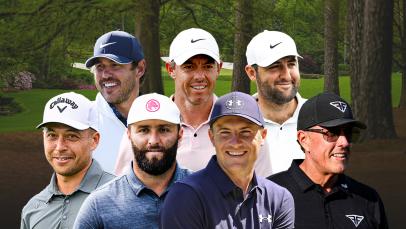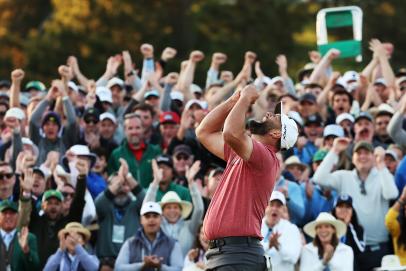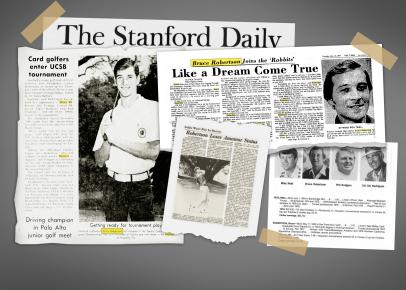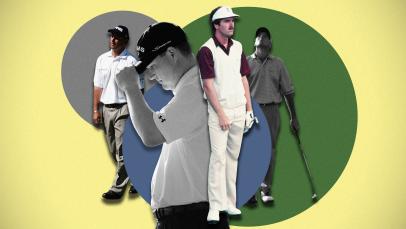Pick sure to go wrong
Masters 2024: Here’s who our astonishingly wrong picker likes at Augusta. Reader discretion advised

Things change.
“Streaming services now command a greater share of viewers than cable …”
“The Iowa-UConn women’s national semifinal drew 14.2 million viewers … more than any World Series game last year, any NBA Finals game last year, and every Daytona 500 since 2013 ...”
“Chick-fil-A makes a major change to its beloved chicken …”
And then there’s this week, where time slips back on itself, Mobius strip like, saving us perfectly, albeit briefly, from a world awash in baseless rancor and chronic infantilism and a sea of self-destruction from foes real, imagined and AI-generated. The Masters, thankfully, does not change. Or appears never to, but always does, seamlessly, like Patricia Clarkson or Jose Andres or Jim Nantz, or, well, Chick-fil-A. Wait, the chicken at Chick-fil-A is changing? The apocalypse is upon us. What’s next, the sun turning black?
(Shut. Up.)
Thankfully, the Masters remains the biggest golf tournament of any kind on any planet. It matters more than money or trophies or jackets or even Instagram posts (although there is an official Masters Instagram page, which sort of feels like home delivery of Masters food items). Give us the on-site deal, where you can get a pimento-cheese sandwich for a buck-fifty, or approximately $1.50 more than it costs you to stream your favorite player hitting every shot in his second round, on Masters.com. Take that Fubo TV.
Also, for those who’ve been paying attention to this space for the last decade (and you three know exactly who you are and I deeply regret all the harm to the stability of your home life I have caused), it also neatly and perfectly equates to the approximate value of heeding the advice of my annual prediction to win the green jacket.
Translation: I am a colossal idiot and have correctly chosen the winner of the Masters nearly as many times as my dogs have (which would be zero to their “two,” but they are in fact degenerate gamblers and have the history of problem drinking episodes to prove it). In short, read this treatise the way you would the back of a cereal box, were it 1974, or if your phone had been stolen while you slept. Not for any particular nuggets of historically insightful analysis of Masters wisdom, but simply to see if you remember how letters are formed into words. Which, as it turns out, is the same way my editors read most of what I write.
But I digress.
As you know (no, you don’t, you have better things to do), I make my decisions after an exacting look at the statistical record tied to this year’s class of Masters participants. And when I say “exacting look,” what I mean is I read Steve Hennessey’s detailed review of Masters concession menu items and quickly realized that my physician’s recommendation would be that I go on a hunger strike were I ever to attend the Masters again, which as a “journalist” in my case might be literally impossible.
But numbers never lie. It’s just which numbers do I pay attention to. For example, I could do some specific research based on current form or the historical trendlines. (For instance, did you know that more players who’ve won the Masters in the last 15 years had not won a tournament that year before coming to Augusta? I didn’t.) Instead, I will construct some kind of house of toothpicks collage of inanity disguised as data to prove there can be only one guaranteed winner. Essentially, with apologies to systemic change interpreter Steve Kornacki, that modern day Heraclitus, I’m describing the “science” of political polling, or what many now know as “guessing.”
In recent years, I’ve focused on an elimination game of statistical qualifications based on the meaningful performance metrics produced via the PGA Tour’s ShotLink database. But we are in the vast middle of “the change,” professional golf’s male menopause, where we either become something new and better and reinvigorated or well, darker, angrier and deader inside. In other words, I can’t use PGA Tour stats because a meaningful number of competitors for this year’s (and the foreseeable) Masters ply their trade exclusively on the Grow the Game Wallet Tour these days and thus have no statistical record we can use in a comparative sense.
So because the Masters remains this bastion of stability and rectitude (historic racism and sexism, notwithstanding, of course), I thought it best to use only Masters data in determining a winner. At the risk of losing you (like most people with whom I converse on a train or bus), I used how well the last five Masters champions fared in four statistical categories—driving distance, greens in regulation, scrambling and putts per round—during their tournament-winning Masters weeks. Specifically, I chose their statistical rankings in those categories and then came up with the average ranking for the winner in each of those categories.
(Note: I did not include the 2020 Masters played in November. It was a nice event, and Dustin Johnson is a fine champion who likely would have won an earlier Masters had he known how to walk down a flight of stairs in stocking feet, or whatever it is that kids are calling it these days. But the 2020 edition was about as real a Masters as George Lazenby was a real James Bond. Sean Connery, Goldfinger, full stop.)
Moving on. To find this year’s winner, I then counted the number of times each player in this year’s field finished with the same rank in those respective statistical categories in the last five (real) Masters. In other words, in the case of greens in regulation, the average rank was 10th, so every time a competitor in this year’s Masters ranked 10th in driving distance at the Masters in any of the last five years, he tallied a “point” (as in, “what I’m missing”). Thus, the obvious winner of this year’s Masters would be (let’s call it) “the one accumulating the most points in my matrix,” which I’m pretty sure is the same phrase Mark Zuckerberg used to describe his pre-Meta dating regimen.
The player with the most points, and as it turned out, the only player with a matching statistical rank in each of the four criteria within the last five Masters, is an obvious and laughably defensible choice, Xander Schauffele. (For what it’s worth, “laughably defensible” is what doctors call my low-fat diet of jelly beans, pure cane sugar Dr Pepper and PEZ.) X has top-10s in three recent Masters, was runner-up in 2019 and had eventual champion Hideki Matsuyama in his sights in 2021 had he not misjudged his 8-iron at 16 and made triple. It happens. Personally, I have “misjudged” my 8-iron and made triple. Usually after hitting it into someone’s lanai. (Note: Despite what you have heard, “hitting it into someone’s lanai” is not a reference to insider trading, the mating rituals of the Marquesans or the perils of cave diving. It is literally depositing a Titleist next to the Big Green Egg on someone’s patio, deck or solana, which I have done several times. In the last week. While on the driving range.)

Andrew Redington
Moreover, Schauffele has beefed up his swing speed (up 2.5 miles per hour), ranks second to only the sweet Baby Jesus (Scottie Scheffler) in strokes gained/total and seems primed this week to change his record of near-misses in majors at the place that never changes. Does this restore order in our lives? No. In the world of professional golf? You tell me, after Schauffele leaves the PGA Tour for greener pastures come fall. Either way, the Masters will stand taller in the midst of global change, thankfully once again sheltering us from the reality we so desperately need to escape.
Now, for the love of all things natural and unchanging, Chick-Fil-A, a word, if I might …
MORE GOLF DIGEST MASTERS COVERAGE





